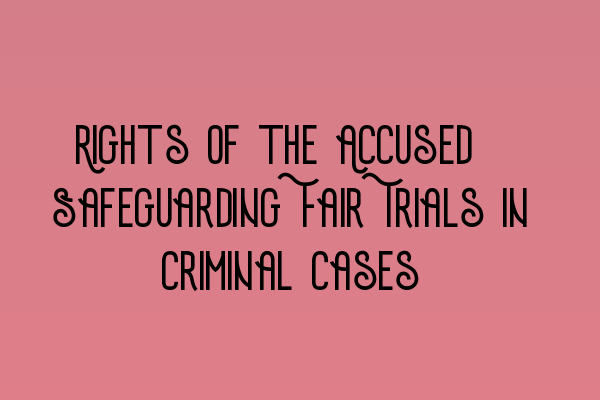Rights of the Accused: Safeguarding Fair Trials in Criminal Cases
In the criminal justice system, one of the fundamental principles is that every person accused of a crime has the right to a fair trial. This important right ensures that individuals are treated justly and are given the opportunity to present their case within a framework that guarantees fairness and impartiality.
Presumption of Innocence
One of the cornerstones of fair trials is the presumption of innocence. This principle states that every person accused of a crime is considered innocent until proven guilty. This ensures that individuals are not unfairly stigmatized or punished before their guilt is established by a court of law.
The presumption of innocence is essential in protecting the rights and dignity of the accused. It places the burden of proof on the prosecution to establish guilt beyond a reasonable doubt. This principle reinforces the need for a thorough and impartial investigation, thereby reducing the risk of wrongful convictions.
Right to Legal Representation
Another crucial right of the accused is the right to legal representation. This ensures that individuals have access to legal advice and defense, allowing them to effectively navigate the complex legal system. Adequate legal representation helps to balance the power dynamics between the accused and the prosecution, promoting fairness and justice.
Legal representation is not only reserved for the affluent; it is a right that should be afforded to every accused individual, regardless of their financial means. Legal aid schemes exist to provide access to legal representation for those who cannot afford it. This ensures that everyone has equal access to justice and prevents the defenseless from being disadvantaged.
Right to a Public Trial
The right to a public trial is another critical safeguard in criminal cases. It ensures transparency and accountability in the judicial process. Open court proceedings allow the public and the media to observe the trial, fostering public trust and confidence in the legal system.
Public trials also serve as a check on the conduct of the trial participants, including judges, prosecutors, and defense attorneys. It prevents abuses of power and enhances the fairness of proceedings. However, there are circumstances where the court may restrict public access to protect sensitive information or the rights of the parties involved.
Right to a Speedy Trial
The right to a speedy trial is essential to prevent prolonged pretrial detention and ensure timely resolution of criminal cases. Delays in the legal process can have detrimental effects on the accused, including increased stress, financial burden, and the erosion of evidence.
To safeguard the right to a speedy trial, legal systems have established time limits within which trials must be conducted. These time limits vary across jurisdictions, but their purpose remains the same – to ensure efficient and fair administration of justice. It is important for both the prosecution and the defense to work collaboratively in expediting the trial process while respecting the rights of the accused.
Conclusion
The rights of the accused play a crucial role in safeguarding fair trials in criminal cases. The presumption of innocence, right to legal representation, right to a public trial, and right to a speedy trial are all integral elements that contribute to the fairness and integrity of the criminal justice system.
At SQE Criminal Law & Practice Law UK, we believe in upholding these rights and ensuring that every accused individual receives a fair trial. Our SQE 1 Practice Exam Questions and SQE 1 Practice Mocks FLK1 FLK2 courses are designed to help aspiring lawyers prepare for the SQE exams and understand the legal principles underlying fair trials. Whether you are looking for SQE 2 preparation courses or SQE 1 preparation courses, we have the resources and expertise to support your journey.
Stay updated with the latest SRA SQE exam dates and equip yourself with the knowledge and skills needed to champion the rights of the accused. Together, we can contribute to a more just and equitable legal system.
